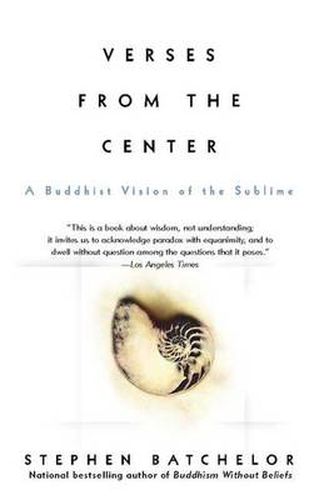Readings Newsletter
Become a Readings Member to make your shopping experience even easier.
Sign in or sign up for free!
You’re not far away from qualifying for FREE standard shipping within Australia
You’ve qualified for FREE standard shipping within Australia
The cart is loading…






A Buddhist scholar and former monk, Stephen Batchelor is well known to American readers as the author of the bestselling Buddhism Without Beliefs. Now comes Verses from the Center, his vision of the poetic legacy of Nagarjuna, a visionary monk who lived in India in the second century and who is, Batchelor writes, ‘arguably the most important figure in Buddhism after the Buddha himself.’ … In addition to providing useful guidance to the key philosophical concepts, Batchelor’s introduction also delves into the colorful strata of myth and legend surrounding the man and his work, and traces the historical traditions of centrist thought all the way from Nagarjuna’s Chinese contemporary Lao Tzu to the English Romantic poet John Keats … This is a book about wisdom, not understanding; it invites us to acknowledge paradox with equanimity, and to dwell without question among the questions that is poses.
$9.00 standard shipping within Australia
FREE standard shipping within Australia for orders over $100.00
Express & International shipping calculated at checkout
Stock availability can be subject to change without notice. We recommend calling the shop or contacting our online team to check availability of low stock items. Please see our Shopping Online page for more details.
A Buddhist scholar and former monk, Stephen Batchelor is well known to American readers as the author of the bestselling Buddhism Without Beliefs. Now comes Verses from the Center, his vision of the poetic legacy of Nagarjuna, a visionary monk who lived in India in the second century and who is, Batchelor writes, ‘arguably the most important figure in Buddhism after the Buddha himself.’ … In addition to providing useful guidance to the key philosophical concepts, Batchelor’s introduction also delves into the colorful strata of myth and legend surrounding the man and his work, and traces the historical traditions of centrist thought all the way from Nagarjuna’s Chinese contemporary Lao Tzu to the English Romantic poet John Keats … This is a book about wisdom, not understanding; it invites us to acknowledge paradox with equanimity, and to dwell without question among the questions that is poses.